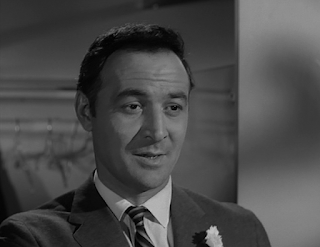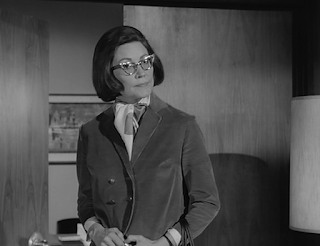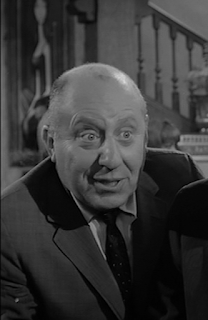
What is "The World's Oldest Motive"? An answer is suggested by the story of the same title, written by Larry M. Harris, which appeared in the December 1959 issue of Alfred Hitchcock's Mystery Magazine.
Philip Devize may be a wealthy, middle-aged, married man, but that hasn't stopped a young, beautiful woman named Flora Arnold from spending evenings with him. He thinks of murdering his wife, who married him for his money and won't think of divorce, but, as an avid reader of detective stories, Philip knows that he would never get away with it. Fortunately, a man named Schustak walks into his office one day, aware of his predicament and prepared to render a service.
Schustak says that he belongs to a well-known organization and that he can dispose of Mrs. Devize for a fee. Schustak leaves his card with Philip and, in the days that follow, Flora encourages Philip to explore the offer. He telephones Schustak and visits the man at his office, where he balks at the fee of $10,000. Schustak is well aware of Philip's wealth, however, and soon the deal is done.
Philip waits with Flora before going home to confirm that his wife is dead. Yet when Philip arrives home, his wife is very much alive! Meanwhile, Schustak and Flora agree that Philip was an easy man to bilk out of a $5000 deposit for a murder that was never going to happen.
 |
| Henry Jones as Alex Morrow |
The surprise ending of the story seems to say that the world's oldest motive is not love, it is money. Larry M. Harris (1933-2002), the story's author, was best known as a science fiction writer under the name Laurence M. Janifer. He wrote short stories and novels from the early 1950s until his death and was also an editor, film reviewer, and pianist.
Larry Davidson was assigned to adapt Harris's story for the small screen. His previous teleplays were either based on his own original teleplay for another series ("See the Monkey Dance") or an original teleplay ("Misadventure"), so "The World's Oldest Motive" was the first time he was asked to adapt another writer's work for the small screen. Had the series continued into another season, it is possible that Davidson might have contributed more teleplays. However, this was to be his last for The Alfred Hitchcock Hour.
Expanding a seven-page story into an hour-long TV show requires new characters and new scenes, and Davidson provided both. The TV show begins with Alex Morrow (as Philip Devize has been renamed) in his office, more interested in his stamp collection than his law practice. After his wife telephones and he claims to be working late, we see him dancing with a much younger woman at a dance club called the Casa a Go-Go. The sight of Henry Jones (as Alex) dancing the Jerk, a fad dance that was popular at the time the show was filmed, is very funny, and makes it clear at the outset that the show will be played for laughs. Alex is nervous when Schustak walks by and stares at him; he thinks that the stranger is following him.
A loud acquaintance named Jamieson stops by Alex's table and lets slip that he is married; Fiona (as Flora has been renamed) storms out of the club and Alex rushes after her. On the sidewalk outside, she tells him that their relationship is over, but he assures her that he will find a solution. Alex again sees Schustak watching him.
 |
| Linda Lawson as Fiona |
At home, Alex's wife, Angela, who does not appear in the short story, is portrayed as frumpy, in contrast with the young, beautiful Fiona. Her hair in curlers and covered with a hair net, Angela is wrapped in a shapeless, quilted robe, making eggnog before bedtime and insulting her husband. They bicker about their unhappy marriage and she laughs at the idea that Alex has a girlfriend. Angela denies hiring a man to follow him, though she admits that a man who said he was an insurance salesman came around asking questions.
Back at the office the next evening, Alex takes a call from Fiona, who says she does not want to see him. Schustak appears, cornering Alex in the bathroom and following Alex into his office to make his sales pitch. There is a long dialogue scene between the two men, after which Alex visits Fiona and finds her by the pool outside her apartment complex. She tries to avoid him and he ends up falling into the pool, fully dressed. Again, her youth and beauty are contrasted with his wife's appearance after there is a cut back to the Morrow home. Angela receives a shock from a faulty plug, which suggests a method for murder, and she admits to her husband that she cheated on him when she was younger. Angela slaps Alex before he can slap her, increasing his humiliation.
 |
| Robert Loggia as Schustak |
Angered, his pride hurt, Alex telephones Schustak and arranges a meeting. The men meet on a golf course, where they discuss Angela's murder; the price has been raised to $15,000--$7500 now and $7500 on completion. Alex visits Fiona and explains his plan, but she has an unexpected reaction and tells Alex that he must stop Schustak or she will not have anything more to do with him.
Alex meets Schustak in the man's car and pays him the remaining $7500, but it is too late to stop the process of killing Angela. Schustak tells Alex that he must rush home and prevent Angela from taking fatal pills that have been substituted for her vitamins. Alex hurries home and finds Angela alive and well. Realizing he has been duped, Alex telephones Schustak, who answers and hands the telephone to Fiona. They are packed for a long trip and she promises to send Alex postcards with interesting stamps for his collection. She hangs up and tells Schustak that they should be able to retire soon; they have been running this con game for five years. At home, Alex is crestfallen and resigned to his future with Angela.
 |
| Kathleen Freeman as Angela Morrow |
Comparing the TV show to the short story reveals the addition of Alex's interest in his stamp collection, in which his life savings are tied up; the valuable collection means more to him than his wife. There is no mention of his love of detective stories; in the short story, this is how Flora and Schustak know that he will be willing to believe the murder plot. The dance club scene is added and provides humor while underlining the age difference between Alex and Fiona. In the TV show, Fiona pretends to be unaware that Alex is married, and when she finds out, she wants to break up with him. This adds urgency to Alex's desire to be rid of Angela. Schustak follows Alex before appearing at his office, adding mystery and suspense to the early scenes. The scenes at home with Angela are new, and the contrast between her and Fiona is both humorous and pathetic as it underlines the married couple's broken relationship.
 |
| Dee J. Thompson as Miss Rice |
The scene by the pool is also new, and having Alex fall in fully clothed adds slapstick humor. Angela's confession to Alex that she cheated on him in the past helps drive his decision to go forward with the plan to murder her. He then meets with Schustak on a golf course rather than at the man's office, in a satire of similar meetings that occur daily in the world of business. In the short story, Flora is supportive of the plan to kill Philip's wife, while in the TV show, Fiona is aghast at the suggestion. Her insistence that Alex prevent the murder adds more suspense and allows Schustak to collect the second half of his fee. At the end, in the TV version, Alex telephones and speaks to Schustak and Fiona after he has been conned; this underlines what happened to him and demonstrates through dialogue that it is a pattern, not a one-time event.
 |
| Joseph Mell as Jamieson |
"The World's Oldest Motive" features a solid cast and the humorous approach to the story works well, though the show drags a bit in spots and shows the pitfalls of expanding a thin plot into an hour-long episode. It shares similar themes with Davidson's prior teleplays for The Alfred Hitchcock Hour, including a love triangle and murder as a proposed solution.
The show is directed by Harry Morgan (1915-2011), who was born Harry Bratsberg and who was best known as an actor. He was on stage, in movies, or on TV for over sixty years, from the 1930s through the 1990s, starring in four long-running TV series, including M*A*S*H from 1974 to 1983. He does not have many credits as a director and he only worked in this capacity on TV. He directed this and one other episode of The Alfred Hitchcock Hour; he also appeared as an actor in the episode, "Anniversary Gift."
As Alex Morrow, Henry Jones (1912-1999) is wonderful, fully embodying the role of a henpecked, middle-aged man who prefers his hobby and his girlfriend to his wife. Jones won a Tony Award for his 1958 role in "Sunrise at Campobello" and was a fixture in character roles in film and on TV from 1943 to 1995. He was on countless shows, including The Twilight Zone, Thriller, Night Gallery, and The Night Stalker, and he appeared on the Hitchcock show six times, including "De Mortuis." He was also in Hitchcock's classic, Vertigo (1958).
Linda Lawson (1936- ) is suitably sexy as Fiona; born Linda Gloria Spaziani, she was on screen from 1958 to 2005, mainly in television roles. She was in the film Night Tide (1961) and she was seen on the Hitchcock show three times, including "Three Wives Too Many."
Rounding out the leads is Robert Loggia (1930-2015) as Schustak. Trained at the Actors Studio, he appeared on screen from 1951 to 2019, including starring in a spy series, T.H.E. Cat, during the 1966-1967 TV season. Loggia was featured in four episodes of the Hitchcock show, including "The Money."
In supporting roles:
- Kathleen Freeman (1919-2001) as Angela, Alex's wife; she started out as a child in vaudeville, had a long screen career that lasted from 1948 to 2003, and did extensive work as a voice actress. She appeared on Batman and The Night Stalker, and she was on one other episode of The Alfred Hitchcock Hour--"You'll Be the Death of Me," which starred Robert Loggia.
- Dee J. Thompson as Miss Rice, Alex's secretary; she was on screen from 1949 to 1967 and appeared in six episodes of the Hitchcock series, including "Three Wives Too Many," with Linda Lawson.
- Joseph Mell (1915-1977) as Jamieson, the boor in the dance club; born Joseph Mellovitz, he was a familiar face on TV from 1951 to 1977 and also appeared on The Twilight Zone.
Watch "The World's Oldest Motive" here.
Harris's short story appears to have been adapted for German television in 1980 as "Wer anderen eine Grube grabt." The IMDb credits give as sources novels by Larry M. Hansen and Stanley Ellin, but one of the characters is listed as "Schustak," so this may be another adaptation of "The World's Oldest Motive."
The story was also adapted for the remake of Alfred Hitchcock Presents in the 1980s, airing as a 30-minute episode titled "World's Oldest Motive" on USA on April 11, 1987. This version eschews humor for suspense and a frantic pace; the main character's wife is less of a caricature and tries to reconcile with her husband, causing him to regret his actions and try to prevent her murder. The show pales in comparison with the version aired on The Alfred Hitchcock Hour.
Thanks to Peter Enfantino for providing a copy of the short story!
Sources:
The FICTIONMAGS Index, www.philsp.com/homeville/FMI/0start.htm.
Harris, Larry M. "The World's Oldest Motive." Alfred Hitchcock's Mystery Magazine, Dec. 1959, 70-76.
Grams, Martin, and Patrik Wikstrom. The Alfred Hitchcock Presents Companion. OTR Pub., 2001.
IMDb, IMDb.com, www.imdb.com/.
Stephensen-Payne, Phil. "Galactic Central." Galactic Central, philsp.com/.
Wikipedia, Wikimedia Foundation, www.wikipedia.org/.
"The World's Oldest Motive." The Alfred Hitchcock Hour, season 10, episode 25, NBC, 12 April 1965.
"World's Oldest Motive." Alfred Hitchcock Presents, season 2, episode 12, USA, 11 April 1987.
* * * * *
Lewis Davidson on The Alfred Hitchcock Hour: An Overview and Episode Guide
The three episodes of The Alfred Hitchcock Hour with teleplays by Lewis Davidson aired between November 1964 and April 1965, during the show's final season.
"See the Monkey Dance" was first broadcast on British TV as part of the anthology series, Suspense. That episode is now lost and it is possible that Davidson used essentially the same teleplay for The Alfred Hitchcock Hour. The American version features strong performances by Roddy McDowall and Efrem Zimbalist, Jr., in a story of adultery and murder set in Wales that features many twists and turns.
"Misadventure" is an original teleplay by Davidson. This episode also has excellent performances by Barry Nelson and Lola Albright and is similar to "See the Monkey Dance" in that it deals with a love triangle and murder, though this time the events play out in suburban America.
Finally, "The World's Oldest Motive" adapts a short story and takes a comedic approach. Adultery and murder are still the topics at hand, but this time they are played for laughs and no killing takes place.
Taken together, the three episodes display an interest in unhappy marriages and adultery, with the storytelling approaches either purely comic or a mix of comedy and murder. Davidson shows a talent for clever dialogue and complicated plotting, though his original efforts are more impressive than his adaptation.
EPISODE GUIDE-LEWIS DAVIDSON ON THE ALFRED HITCHCOCK HOUR
Episode title-"See the Monkey Dance" [10.5]
Broadcast date-9 November 1964
Teleplay by-Lewis Davidson
Based on "See the Monkey Dance," a teleplay by Lewis Davidson
Episode title-"Misadventure" [10.8]
Broadcast date-7 December 1964
Original teleplay by-Lewis Davidson
First print appearance-none
Broadcast date-7 December 1964
Original teleplay by-Lewis Davidson
First print appearance-none
In two weeks: Our coverage of Sarrett Rudley begins with "The Baby Sitter," starring Thelma Ritter and Mary Wickes!
2 comments:
Maybe I don't remember it correctly, but nearly my only problem with this one is that it's missing that little disclaimer by Hitchcock at the end, which would've told how the swindlers got caught. Maybe Alex ASKED to get swindled, like anyone paying a hit man, but it still bothers me a little.
(Of course, how could he have gotten his money back even if they HAD gotten caught? So maybe that bothers me for no reason.)
As great as VERTIGO is, to a lot of people Henry Jones' great suspense movie role is in THE BAD SEED. He and Patty McCormick are perfect together in it.
And of course no one could play scary wives (and landladies and bosses and so on) better than Kathleen Freeman, especially in comedies.
You're right--no disclaimer at the end by Hitch. I've never seen The Bad Seed but I'll have to check it out now that I know Henry Jones is in it. I just love him. And I agree with you about Kathleen Freeman!
Post a Comment